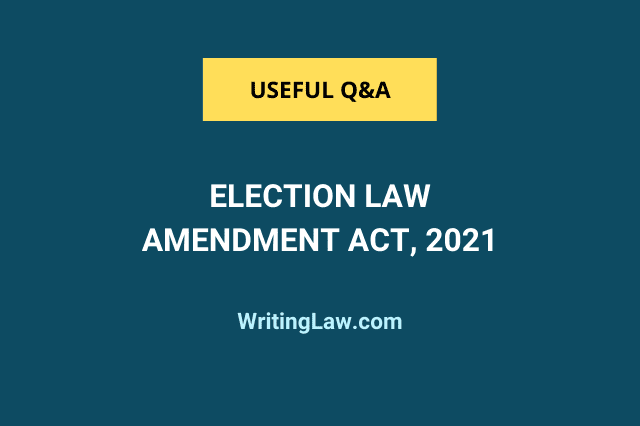
The 2nd last week of December 2021 saw the adoption of an Act amending the law relating to elections. It amends the Representation of the People Acts, 1950 and the Representation of the People Acts, 1951. The fundamental change relates to introducing a provision to link the Aadhaar number with the electoral rolls.
Key Features of the Election Law (Amendment) Act, 2021
(a) It amends sections 20(6) and 60 of the Representation of Peoples Act, 1950 and 1951. The Act attempts to bring gender neutrality. The Act replaces the word “wife” with “spouse” to make the laws gender-neutral. Now, the husband will also register as a service voter.
(b) The Act increases the number of qualifying dates for revising electoral rolls from one per year to four per year. At present, January 1 of every year is the qualifying date. Each year, those turning 18 by that day are eligible to be the voter. The amendments have now included April 1, July 1, and October 1, so applicants do not need to wait until the end of the year to apply.
(c) The amendment allows for the requisition of any property to store election materials and the accommodation of security forces and election personnel.
(d) Last but not least, this Act proposes a change to section 23 of the Representation of People’s Act, 1950, which will enable electoral roll data to be linked with Aadhaar data.
The Bone of Contention
Under the new amendment, an electoral registration officer may require a voter to provide his Aadhaar number as proof of identity. To authenticate their entries in the electoral roll, even people who are already enrolled “may” be required to provide Aadhaar numbers by the officer. According to the amendment, due to the inability to provide an Aadhaar number, no one will have their names removed from the electoral roll.
Criticism From the Opposition Regarding Election Law (Amendment) Act, 2021
Here are the major criticisms made by various scholars and opposition regarding this Act:
(a) The information may help political parties to select voters as favourable or unfavourable. Political parties could identify favourable and unfavourable voters using this information. By linking electoral IDs to Aadhaar numbers, the government will be much better able to determine which voters have received welfare subsidies.
(b) This may cause large-scale deletions of names, either inadvertently or intentionally.
(c) In addition, it violates the Supreme Court judgment restricting the use of Aadhaar with the financial and welfare benefits given by the government and bars its unnecessary expansion to other areas of life.
(d) It is involuntary, as it also prescribes the reasons for not submitting the Aadhaar number.
(e) This policy violates individual privacy by linking Aadhaar details to voter identity cards.
(f) The member of parliament, Asaduddin Owaisi, said that “the Act is outside the legislative competency of parliament. It violates the principle of the secret ballot, universal franchises, free and fair election.”
Government’s Stand on Election Law (Amendment) Act, 2021
(a) It is voluntary, as it stipulates that no person can be denied inclusion in the electoral roll or any entry deleted for failing to provide an Aadhaar number.
(b) By linking the Aadhaar database (which contains every resident’s unique identification number) with the electoral rolls, the Aadhaar database can verify the identity of voters.
(c) It restricts the practice of enrolling the same person in multiple places and those who figure in the electoral rolls in over one constituency. Section 17 of the Representation of People Act, 1950, states, ‘no person shall be entitled to be registered in the electoral roll for more than one constituency.’
(d) After linking Aadhaar to the electoral roll data system, the electoral roll data system will instantly inform a person when they apply for new registration of previous registrations.
Read Next:
1. Menstruation Benefits Bill – What You Need to Know!
2. Transgender Persons Protection of Rights Act – Key Points
3. What Is AFSPA, Demand for Its Repeal, and Constitutionality
4. What Is Anti-Defection Law as Per the Indian Constitution
- What Is Remission Under Criminal Law in India? - 12th November 2023
- What Is the Doctrine of Part Performance Under the Transfer of Property Act? - 4th September 2023
- What Is the Places of Worship Act, 1991 and Its Objectives? - 30th July 2023







